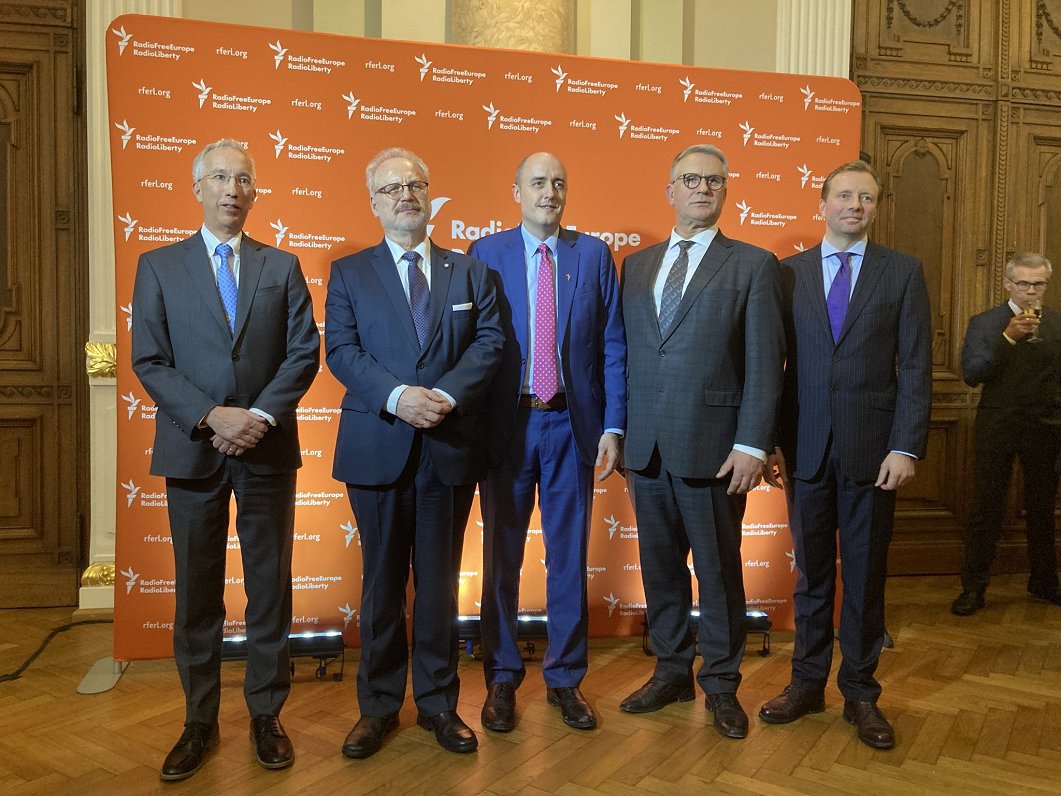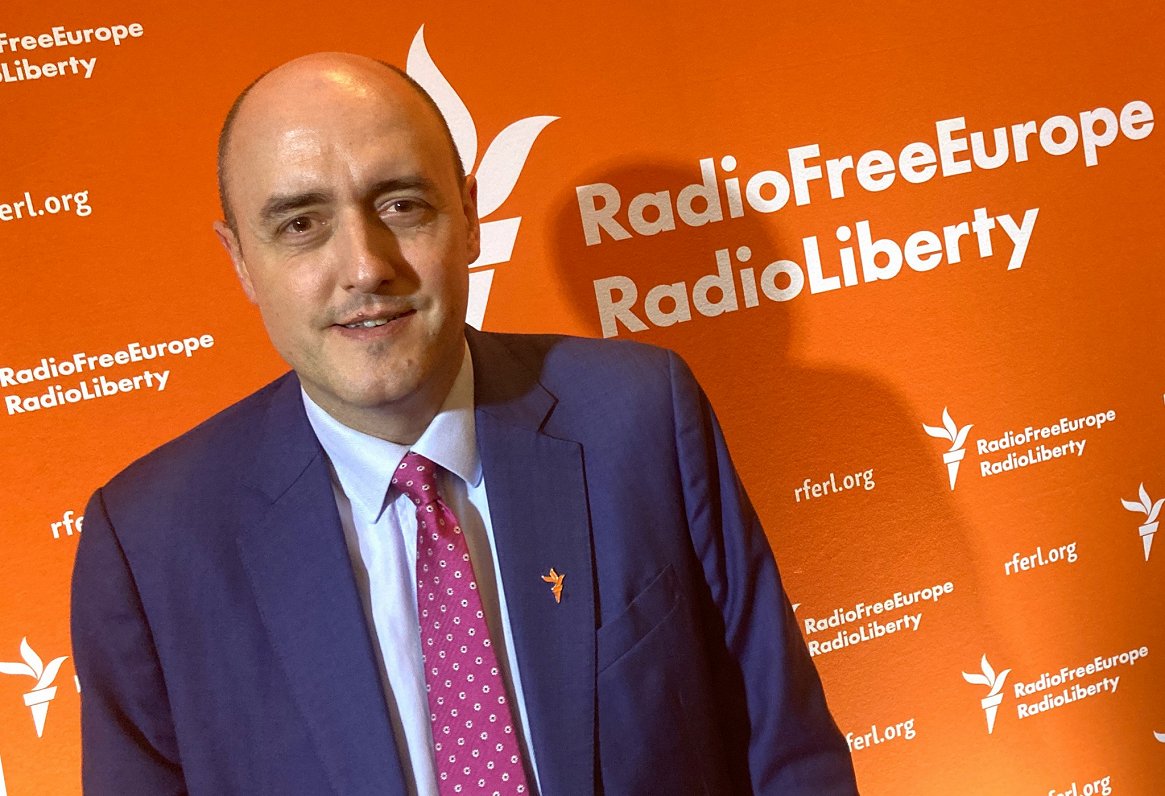In an effort to counter Kremlin disinformation and provide Russian speaking audiences with trusted news and objective reporting, the US-funded Radio Free Europe/Radio Liberty (RFE/RL) has opened a bureau in Riga.
“RFE/RL is returning to Rīga with a new office that will house both journalists from our Russian service and Russian language network Current Time, many of whom are exiled from Russia“, RFE/RL President and CEO Jamie Fly said at the official opening of the new bureau on 12 January.
“This will enable to reach growing audiences inside Russia despite the Kremlin crackdown on our journalist and on independent media more broadly.“
The new RFE/RL office was welcomed at the event in the Latvian National Museum of Art by Latvian President Egils Levits who stressed that the station is a broadcasting company of Latvia's ally and strategic partner – the United States.
In his speech, Levits recalled RFE/RL’s role during the Cold War, when the US broadcaster beamed information from the "free West" to the other side of the Iron Curtain, providing Latvians and other people there with straight news uncensored by the communist regime. RFE/RL is thus familiar to Latvians and considered a symbol of free thought, the Latvian head of state pointed out.
Speaking in front of numerous media professionals, parliamentarians and members of the diplomatic corps, Levits said the aim of RFE/RL's mission had not changed:
“To help the people and the countries, where access to objective information is limited, where free press is virtually non-existent and journalistic freedom is being oppressed in many ways, to access impartial and objective reporting.“
This is especially important since Russia has slipped back into authoritarianism and its ruling regime restricts freedom of speech and expression, the Latvian head of state noted.
Established in 1950 at the beginning of the Cold War, the US-broadcaster was long based in Munich before moving its headquarters to Prague in 1995. RFE/RL is financed by the US Congress but says it operates without any US government interference and editorially independent of Washington. More than 37 million people every week tune to their coverage that provided by networks of local reporters in 27 languages and 23 countries, according to its own accounts.
Forced closure of Moscow bureau
RFE/RL has had a physical presence in Russia since 1991 but was forced to shut its office in Moscow due to Russia's crackdown on the media. The Riga office hopes to counter the impact of this closure.
"We still there on the ground. Not in a formal bureau but we do some reporting. It has to be done very differently than it was before the full-scale invasion," Fly told LSM at the sidelines of the opening event, adding that he hopes for RFE to be able to go back to Russia in the future.
"We are optimistic that just as we were invited into Moscow in 1991 by President Yeltsin that one day a future Russian government will again invite us in, and we will be able to serve the Russian people from Moscow once again, " the RFE/RL CEO, a former adviser to the US president George W. Bush administration, said. "We obviously do not know when that is but we hope it is one day soon."
A number of other Western media organizations have been also suspending their operations in Russia in the wake of Moscow's pressure on foreign media outlets.
Some of them like the German broadcaster Deutsche Welle have also moved to Latvia, along with numerous editorial offices and websites of Russian online and print publications. However, the relocation of some of them has not been without incident and controversy. One of the most prominent issues was the one of the
independent Russian television channel Dozhd (TV Rain), which recently had its right to broadcast revoked by Latvian regulators.

"Strategic move" to Riga
For RFE/RL Riga bureau chief Elmārs Sveķis the controversy around Dozhd neither raises any alarm for RFE/RL nor will it have any impact on the activities of the US-funded broadcaster in Riga.
"We have very high editorial standards. We are an international media organization. So we look at each of the stories from all sides in line with our standards", he told LSM, calling the relocation to Rīga a "strategic move" by RFE/RL. "In effect, the plan started even before Russia attacked Ukraine.”
And the plan is ambitious – RFE/FL aims high: The office is starting out with currently around 40 people but gradually plans to increase its staff to more than 100 people. "A bit, obviously, it all depends on funding and availability of it”, Sveķis noted, indicating that the goal is to create a state-of-the-art facility and safe home for journalists who have been forced to flee to carry on with their work.
"We also hope that we can integrate in the media environment here in Latvia and in the Baltics, and develop partnerships.”
Culture Minister Nauris Puntulis voiced similar hopes and expectations. In his greeting speech at the opening event he considered the launch of the RFE/RL an important step for the "free and independent" Latvian media landscape and information space.
"The opening of the new office will definitely contribute to the diversity and the information available in the space", Puntulis said, adding that it increases its "spread and depth."
Returning to the Baltics
Earlier in the week, RFE/RL also launched a new office in neighbouring Lithuania to reach growing Belarusian- and Russian-language audiences in Belarus in response to state propaganda and censorship. Opening the bureaus in Rīga and Vilnius basically mark the broadcaster’s physical return to both Baltic capitals, where the media outlet was already present after the restoration of independence from 1992 until 2004.
The same year also the final broadcasts of the Lithuanian and Latvian language services of RFE/RL, that were operated from 1975 on, went on air – as did the last episode of the then also existing Latgalian language service.
“I myself as an expat and interviewee took part in many programs of Radio Free Europe/Radio Liberty back in the 1980es. It was the time when its offices were still located in Munich”, President Levits, who spent part of his early life in Germany, also dived into his own past in his speech and personal relationship with RFE/RL.
“I went to all of these programs with big awareness that this is indeed the voice of freedom, the radio station which promotes free speech and speaks in behalf of the free world from the other side of the Iron Curtain which was extremely important for us.“
Culture Minister Nauris Puntulis echoed this assessment. “The Latvian service of Radio Free Europe / Radio Liberty was instrumental in keeping the idea about free and independent Latvia alive and it significantly contributed to our resistance to the Soviet occupation”, he said, noting that Latvians have been enthusiastic consumers of the RFE/RL reporting. “Radio Free Europe/Radio Liberty undeniably made the falling of the Iron Curtain a lot quicker and it came of lot sooner.”
Having historically served Latvian audiences during a dark period in Latvia’s history, RFE/RL now wants to revive the “a partnership with the Latvian people that was forged in an earlier time under very difficult circumstances“, as Fly has put it in his speech.
“We are returning this time to work together to help our Russian – and in case of the office in Vilnius – Belarusian friends who have yet to experience and enjoy the freedom that our societies experience and benefit from every day.“
Challenging media environment
However, Latvian veteran RFE/RL journalists are sceptical that the US-broadcaster will be able take on the same role as in the times of the Cold War.
“Pure radio broadcasts – that time is over”, Valdis Labinskis, the last head of the Latvian language service and the 2004 closed RFE office in Riga, told LSM. Back then in the 1980s, when he was working for RFE/RL first in Munich and later in Prague, the radio was a mass medium that was able to reach almost everyone, including ordinary people. “And the masses were actually interested too”, he underlined.
Nowadays, it is “incomparably harder”, according to Labinskis, to reach the audiences, especially with pure information. Opinions are instead now rather formed by shows and entertainment formats. “You have to work a lot on that and the impact that RFE had back in the days is almost impossible to achieve,“ he claimed, adding that one still can influence the audience with new media formats. Thus, he is welcoming the ambitious efforts of his former employer and its return to Riga, considering it an “important and correct step” in times when a new Cold War is descending and a hot war is blazing in Europe.
Culture Minister Nauris Puntulis also acknowledged the currently “much more complicated challenges”. “The Russian propaganda machine has become much smarter and more resourceful in the way it twists people’s emotions and distorts their perceptions. Putin’s disinformation and imperialistic views have closed many million of people towards information that comes from outside, from the Western democracies“, he said, adding that this makes the mission of independent journalists much harder but also more important than ever.
Boosting digital media innovation
Alongside traditional objective reporting by its Russian Service and 24/7 Russian-language news platform Current Time, RFE/RL will try to tackle this challenges by launching a digital innovation lab that will test new story-telling formats and examine new ways to respond to Russian censorship and disinformation. “We are hoping that especially the office here in Riga can really be a hub for innovation, new ideas, new programming”, Fly told LSM, adding that the primary purpose of it is to continue to grow the audience inside Russia, despite the Kremlin's labelling RFE/RL a "foreign agent."
”Our office will produce expended Russian language content offering including investigating journalism, non-news programming for a soon-to-be-launched streaming platform Votvot, which will try to reach Russians who are less interested in political content but still hungry for independent sources of iinformation, ” Fly pointed out.
“We want to make sure that our content is evolving to meet the needs of the Russian audience, as they go through significant challenge ever since Putin`s invasion in Ukraine.”
In addition, RFE/RL’s Rīga office is also about to produce Russian-language content for local audiences. “We will do some reporting about the Baltics both for people inside Russia but then also for Russian speakers in the Baltics, “ Fly said, adding that this to provide an important counterpoint to disinformation about the three EU members and the Baltic region. “We hope to tap in the local community and gain knowledge and expertise from Latvians who can contribute to that mission.”



























